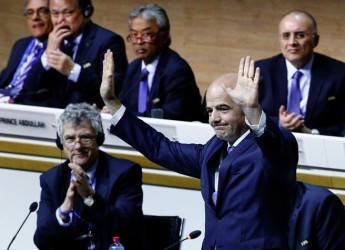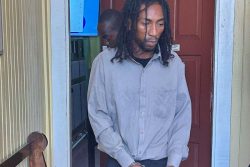ZURICH, (Reuters) – Gianni Infantino vowed yesterday to lead FIFA out of years of corruption and scandal after the former UEFA general secretary was elected to succeed his Swiss compatriot Sepp Blatter as president of football’s world governing body.

“We will restore the image of FIFA and the respect of FIFA, and everyone in the world will be proud of us,” the 45-year-old law graduate, who for the last seven years has been the leading administrator for Europe’s governing body, told an extraordinary FIFA Congress in Zurich.
“I feel a lot of emotion and have not realised yet what has happened today.”
After a first round of voting in which he narrowly beat Asian Football Confedera-tion President Sheikh Salman bin Ebrahim Al Khalifa of Bahrain, Infantino appeared to gather up almost all the votes that had been cast for the two trailing candidates, Prince Ali and Jerome Champagne.
He won 115 of the 207 votes in the second round, giving him a simple majority ensuring a European again holds the top job until 2019 and frustrating the hopes of those looking for a swing to Asia.
Infantino owed his candidacy to the fact that Europe’s preferred candidate, his former boss and UEFA president Michel Platini, was banned from football last year along with Blatter for ethics violations.
“I thank Michel Platini for everything that he has taught me and given me and the work we have done together,” Infantino said. “I have strong, dear thoughts for Mr Michel Platini right now.”
Only the ninth president in FIFA’s 112-year history, he inherits a very different job from that enjoyed by Blatter, who toured the world for 17 years like a head of state, dispensing development funds to his global support base.
Before the election, the Congress had overwhelmingly passed a set of reforms intended to make FIFA more transparent, professional and accountable.
That package should mean the new president faces much closer scrutiny than Blatter did — his salary will be published for the first time — and have less influence over the day-to-day management of the organisation’s business affairs.
NEW GOVERNANCE
The reforms include term limits for top officials and a clear separation between an electedFIFA Council responsible for broad strategy and a professional general secretariat, akin to a company’s executive board, handling the business side.
Infantino’s campaign did not at first glance mark a dramatic change from the naked financial appeals of past elections as he promised member federations more money in his quest for support, and an expansion of the World Cup finals to 40 teams from 32.
But unlike most of the other candidates, Infantino can point to the fact that he never served under Blatter in FIFA’s tainted leadership, having worked for UEFA since 2000.
Sheikh Salman, the bookmakers’ favourite, had been on FIFA’s executive since 2013, and had had to repeatedly deny allegations from rights groups that he had been involved in or known about the detention and torture of Bahraini players in 2011 at the height of a crackdown on anti-government protests.
Following Blatter’s 17-year reign, Infantino’s election maintains Europe’s stranglehold on the running of world soccer, and the continent’s officials were quick to welcome the result.
“It is the first time in a long time that I have felt happy about anything to do with FIFA,” said Executive Committee member Michel D’Hooghe of Belgium. “(Infantino) is a young, dynamic man who has done a superb job at UEFA.”
UEFA executive committee member Karen Espelund of Norway said: “We needed someone credible, we needed a clean winner, a clean man, and I believe we have that in Gianni.”
Blatter too welcomed the appointment but was still trying to take a share of the glory despite a day of speeches from candidates promising to clear up the mess of his watch.
“Gianni Infantino will now have to take over what I started, the last remaining points of the big reform package,” Blatter said.
“The new president cannot cherry-pick now what he likes and what he doesn’t like, that’s quite a task awaiting him.”
COMMERCIAL ACUMEN
Much of Infantino’s pitch centred on his commercial acumen; during his seven years as UEFA general secretary, revenue from Europe’s club competitions has grown dramatically, but so has inequality between the rich, powerful elite clubs in Europe’s four big leagues and the rest.
Many of the skills now required will, however, be in crisis management.
Infantino will hope for at least a brief honeymoon after the firestorm that broke out last May when seven soccer executives due to attend a previous Congress were arrested on suspicion of corruption in a dawn raid on their Zurich hotel.
Blatter survived long enough to win re-election at that Congress, but stepped down four days later as the scandals took their toll.
Since then, criminal investigations in the United States and Switzerland have resulted in the indictment of dozens of soccer officials and other entities for corruption, many of them serving or former presidents of national or continental associations.
In addition, FIFA has been forced to investigate controversies surrounding the awarding of its showpiece, the World Cup finals, especially the decision to grant the 2018 tournament to Russia and the 2022 finals to Qatar, a small, scorching desert state with little soccer tradition.
Swiss authorities are reviewing more than 150 reports of suspicious financial activity linked to those awards, and said on Thursday they had sent more documents including an internalFIFA report to U.S. investigators.
Many key sponsorship deals have been put on hold until FIFA can be seen to have cleaned up its act, resulting in a $108 million deficit for 2015, an official said on Thursday.
Infantino welcomed that challenge.
“I will work tirelessly to bring football back to FIFA and FIFA back to football, this is what we want to do,” he said in his first news conference as president.
“I am not a candidate of Europe I am a candidate of football and football is universal.”







